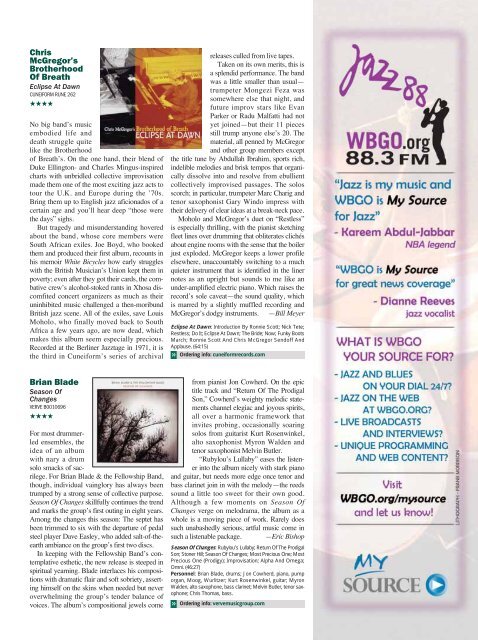Download - Downbeat
Download - Downbeat
Download - Downbeat
You also want an ePaper? Increase the reach of your titles
YUMPU automatically turns print PDFs into web optimized ePapers that Google loves.
Chris<br />
McGregor’s<br />
Brotherhood<br />
Of Breath<br />
Eclipse At Dawn<br />
CUNEIFORM RUNE 262<br />
★★★★<br />
No big band’s music<br />
embodied life and<br />
death struggle quite<br />
like the Brotherhood<br />
of Breath’s. On the one hand, their blend of<br />
Duke Ellington- and Charles Mingus-inspired<br />
charts with unbridled collective improvisation<br />
made them one of the most exciting jazz acts to<br />
tour the U.K. and Europe during the ’70s.<br />
Bring them up to English jazz aficionados of a<br />
certain age and you’ll hear deep “those were<br />
the days” sighs.<br />
But tragedy and misunderstanding hovered<br />
about the band, whose core members were<br />
South African exiles. Joe Boyd, who booked<br />
them and produced their first album, recounts in<br />
his memoir White Bicycles how early struggles<br />
with the British Musician’s Union kept them in<br />
poverty; even after they got their cards, the combative<br />
crew’s alcohol-stoked rants in Xhosa discomfited<br />
concert organizers as much as their<br />
uninhibited music challenged a then-moribund<br />
British jazz scene. All of the exiles, save Louis<br />
Moholo, who finally moved back to South<br />
Africa a few years ago, are now dead, which<br />
makes this album seem especially precious.<br />
Recorded at the Berliner Jazztage in 1971, it is<br />
the third in Cuneiform’s series of archival<br />
releases culled from live tapes.<br />
Taken on its own merits, this is<br />
a splendid performance. The band<br />
was a little smaller than usual—<br />
trumpeter Mongezi Feza was<br />
somewhere else that night, and<br />
future improv stars like Evan<br />
Parker or Radu Malfatti had not<br />
yet joined—but their 11 pieces<br />
still trump anyone else’s 20. The<br />
material, all penned by McGregor<br />
and other group members except<br />
the title tune by Abdullah Ibrahim, sports rich,<br />
indelible melodies and brisk tempos that organically<br />
dissolve into and resolve from ebullient<br />
collectively improvised passages. The solos<br />
scorch; in particular, trumpeter Marc Charig and<br />
tenor saxophonist Gary Windo impress with<br />
their delivery of clear ideas at a break-neck pace.<br />
Moholo and McGregor’s duet on “Restless”<br />
is especially thrilling, with the pianist sketching<br />
fleet lines over drumming that obliterates clichés<br />
about engine rooms with the sense that the boiler<br />
just exploded. McGregor keeps a lower profile<br />
elsewhere, unaccountably switching to a much<br />
quieter instrument that is identified in the liner<br />
notes as an upright but sounds to me like an<br />
under-amplified electric piano. Which raises the<br />
record’s sole caveat—the sound quality, which<br />
is marred by a slightly muffled recording and<br />
McGregor’s dodgy instruments. —Bill Meyer<br />
Eclipse At Dawn: Introduction By Ronnie Scott; Nick Tete;<br />
Restless; Do It; Eclipse At Dawn; The Bride; Now; Funky Boots<br />
March; Ronnie Scott And Chris McGregor Sendoff And<br />
Applause. (64:15)<br />
»<br />
Ordering info: cuneiformrecords.com<br />
Brian Blade<br />
Season Of<br />
Changes<br />
VERVE B0010696<br />
★★★★<br />
For most drummerled<br />
ensembles, the<br />
idea of an album<br />
with nary a drum<br />
solo smacks of sacrilege.<br />
For Brian Blade & the Fellowship Band,<br />
though, individual vainglory has always been<br />
trumped by a strong sense of collective purpose.<br />
Season Of Changes skillfully continues the trend<br />
and marks the group’s first outing in eight years.<br />
Among the changes this season: The septet has<br />
been trimmed to six with the departure of pedal<br />
steel player Dave Easley, who added salt-of-theearth<br />
ambiance on the group’s first two discs.<br />
In keeping with the Fellowship Band’s contemplative<br />
esthetic, the new release is steeped in<br />
spiritual yearning. Blade interlaces his compositions<br />
with dramatic flair and soft sobriety, asserting<br />
himself on the skins when needed but never<br />
overwhelming the group’s tender balance of<br />
voices. The album’s compositional jewels come<br />
from pianist Jon Cowherd. On the epic<br />
title track and “Return Of The Prodigal<br />
Son,” Cowherd’s weighty melodic statements<br />
channel elegiac and joyous spirits,<br />
all over a harmonic framework that<br />
invites probing, occasionally soaring<br />
solos from guitarist Kurt Rosenwinkel,<br />
alto saxophonist Myron Walden and<br />
tenor saxophonist Melvin Butler.<br />
“Rubylou’s Lullaby” eases the listener<br />
into the album nicely with stark piano<br />
and guitar, but needs more edge once tenor and<br />
bass clarinet join in with the melody—the reeds<br />
sound a little too sweet for their own good.<br />
Although a few moments on Season Of<br />
Changes verge on melodrama, the album as a<br />
whole is a moving piece of work. Rarely does<br />
such unabashedly serious, artful music come in<br />
such a listenable package. —Eric Bishop<br />
Season Of Changes: Rubylou’s Lullaby; Return Of The Prodigal<br />
Son; Stoner Hill; Season Of Changes; Most Precious One; Most<br />
Precious One (Prodigy); Improvisation; Alpha And Omega;<br />
Omni. (46:27)<br />
Personnel: Brian Blade, drums; Jon Cowherd, piano, pump<br />
organ, Moog, Wurlitzer; Kurt Rosenwinkel, guitar; Myron<br />
Walden, alto saxophone, bass clarinet; Melvin Butler, tenor saxophone;<br />
Chris Thomas, bass.<br />
»<br />
Ordering info: vervemusicgroup.com
















